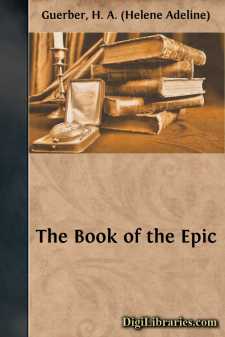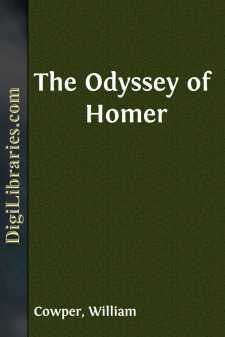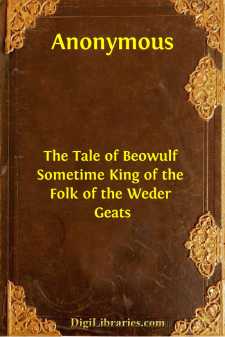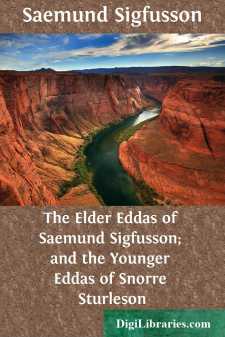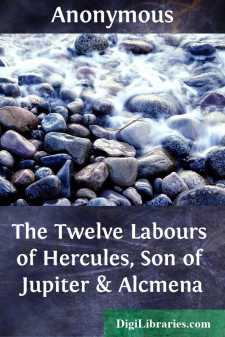Poetry
- American 96
- Ancient, Classical & Medieval
- Asian 15
- Australian & Oceanian 11
- Canadian 11
- Caribbean & Latin American 5
- Children's Poetry & Nursery rhymes 51
- Continental European 11
- English, Irish, Scottish, Welsh 162
- General 483
- Inspirational & Religious 7
- Middle Eastern 3
Ancient, Classical & Medieval Books
Sort by:
INTRODUCTION The impersonal character of the Homeric poems has left us entirely in the dark as to the birthplace, the history, and the date, of their author. So complete is the darkness which surrounds the name of Homer that his very existence has been disputed, and his works have been declared to be an ingenious compilation, drawn from the productions of a multitude of singers. It is not my intention...
more...
INTRODUCTION Every now and then in our reading we come suddenly face to face with first things,—the very elemental sources beyond which no man may go. There is a distinct satisfaction in dealing with such beginnings, and, when they are those of literature, the sense of freshness is nothing short of inspiring. To share the same lofty outlook, to breathe the same high air with those who first sensed a...
more...
by:
Arthur Cropley
FOREWORD Most societies seem to have epic heroes and events that define them as they like to see themselves: Even a young society such as Australia has Ned Kelly, Eureka Stockade, and ANZAC. Others have their Robin Hood, Siegfried, Roland, or Davy Crockett. Lacplesis (Bearslayer) is such a work. Bearslayer is patriotic, brave, strong, tough, loyal, wise, fair, and virtuous, and he loves nature. He...
more...
by:
William Cowper
ARGUMENT In a council of the Gods, Minerva calls their attention to Ulysses, still a wanderer. They resolve to grant him a safe return to Ithaca. Minerva descends to encourage Telemachus, and in the form of Mentes directs him in what manner to proceed. Throughout this book the extravagance and profligacy of the suitors are occasionally suggested.Muse make the man thy theme, for shrewdness famedAnd...
more...
by:
J. J. Howard
THEFirst BookOF THEMETAMORPHOSESOFOVID. From bodies various form'd, mutative shapesMy Muse would sing:—Celestial powers give aid!From you those changes sprung,—inspire my pen;Connect each period of my venturous songUnsever'd, from old Chaös' rude misrule,Till now the world beneath Augustus smiles. While yet nor earth nor sea their place possest,Nor that cerulean...
more...
BOOK FIRST THE COMING OF AENEAS TO CARTHAGE I sing of arms and the man who of old from the coasts of Troy came, an exile of fate, to Italy and the shore of Lavinium; hard driven on land and on the deep by the violence of heaven, for cruel Juno's unforgetful anger, and hard bestead in war also, ere he might found a city and carry his gods into Latium; from whom is the Latin race, the lords of Alba,...
more...
by:
Anonymous
ARGUMENT Hrothgar, king of the Danes, lives happily and peacefully, and bethinks him to build a glorious hall called Hart. But a little after, one Grendel, of the kindred of the evil wights that are come of Cain, hears the merry noise of Hart and cannot abide it; so he enters thereinto by night, and slays and carries off and devours thirty of Hrothgar's thanes. Thereby he makes Hart waste for...
more...
PREFACE. Sæmund, son of Sigfus, the reputed collector of the poems bearing his name, which is sometimes also called the Elder, and the Poetic, Edda, was of a highly distinguished family, being descended in a direct line from King Harald Hildetonn. He was born at Oddi, his paternal dwelling in the south of Iceland, between the years 1054 and 1057, or about 50 years after the establishment by law of the...
more...
by:
Anonymous
The Nemæan Lion. By Juno's hate urged on, Alcmena's Son,At sixteen years his noble toils begun.Nemæa's dreadful Lion first he sought,The savage slew & to Eurystheus brought,From his huge sides his shaggy spoils he tore,Around him threw, & e'er in triumph wore. 2 On Lerna's pest th' undaunted Hero rushes,With massy club her hundred heads he crushes,In vain. One...
more...
by:
Oliver Herford
Medusa How did Medusa do her hair?The question fills me with despair.It must have caused her sore distressThat head of curling snakes to dress.Whenever after endless toilShe coaxed it finally to coil,The music of a Passing BandWould cause each separate hair to standOn end and sway and writhe and spit,—She couldn't "do a thing with it."And, being woman and awareOf such disaster to her...
more...



